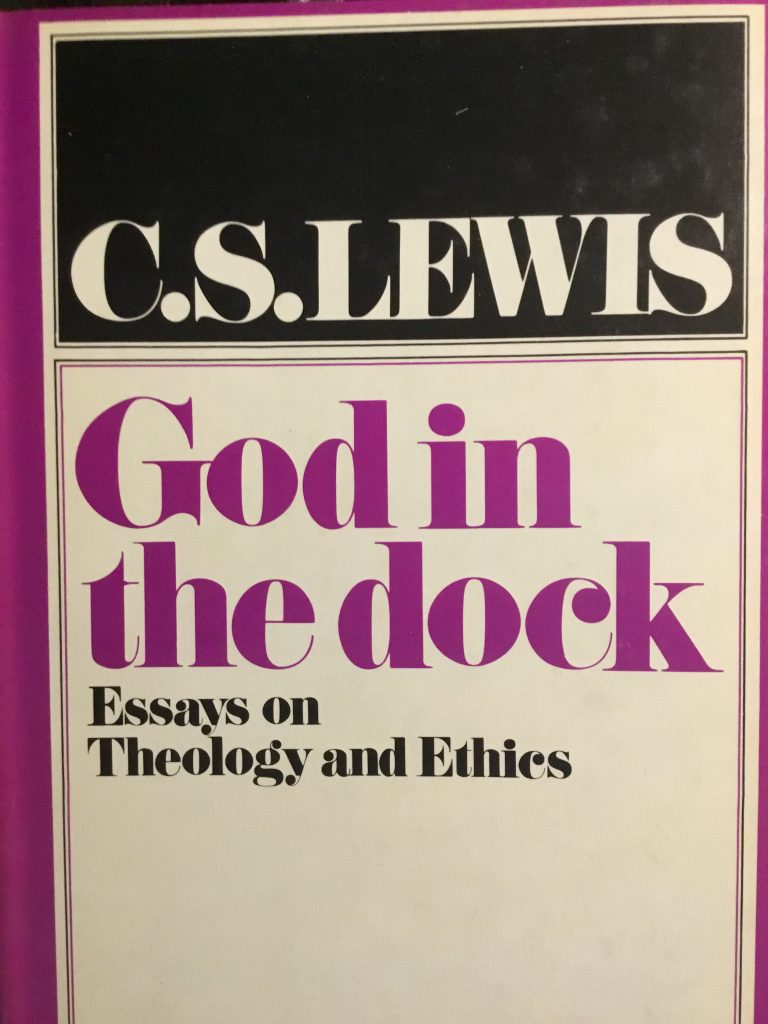Title: God in the Dock: Essays on Theology and Ethics
Author: C.S. Lewis
First published July 2, 1971
346 pages, Paperback
ISBN: (ISBN10: 0802808689)
Rating: 4.23
Overview
C.S. Lewis, hailed as one of the most converted men of his time, presents a collection of forty-eight essays in God in the Dock on the inseparable combination of the natural and supernatural elements of Christianity. Lewis provides insight and observations on theological and ethical questions, from “Evil and God” to “The Humanitarian Theory of Punishment,” all of which demonstrate his profound understanding of Christianity.
These essays, drawn from various sources, illustrate the many different angles from which we view the Christian religion. Lewis’s honesty, realism, and conviction make this book a must-read for all who seek to understand the Christian faith in our modern times.
About the Author
Meet Clive Staples Lewis, an intellectual giant of the twentieth century and a highly influential writer. He spent a considerable amount of time as a Fellow and Tutor in English Literature at Oxford University before taking up the Chair of Medieval and Renaissance Literature at Cambridge University, a position he held until retirement.
With over thirty books to his name, he reached a vast audience, and his works continue to attract new readers every year. Some of his most distinguished and popular accomplishments include The Screwtape Letters, Mere Christianity, The Great Divorce, The Space Trilogy, and the universally acknowledged classics, The Chronicles of Narnia.
The Narnia books alone have sold over 100 million copies and have been adapted into three major motion pictures. Lewis was married to poet Joy Davidman, and interestingly enough, his elder brother was also a writer.
Editoral Review
God in the Dock: Essays on Theology and Ethics by C.S. Lewis is a collection of nineteen essays written by the prolific author and theologian. First published in July 1971, the book brings together a diverse range of topics on religion, ethics and politics, which have been written and published over decades before, in various magazines and literature.
C.S. Lewis was an author, scholar and medievalist, best known for writing highly imaginative novels such as The Chronicles of Narnia and The Space Trilogy, and for his insightful essays on theology and ethics. In God in the Dock, he provides a thought-provoking analysis on various topics such as the nature of free will, the problem of pain, the relationship between Church and State and the existence of God.
The essays tackle a wide range of subjects, from the more specialized topics of theodicy and predestination, to more general philosophical musings that would appeal to a broader audience. One of the key strengths of the essays is Lewis’ ability to set out complex ideas and arguments in a clear, accessible and engaging way.
His writing style is both poetic and intellectual, which adds depth to the content. Lewis provides many examples drawn from contemporary life, which adds relevance and meaning to the arguments he makes.
For instance, in his essay titled “The Humanitarian Theory of Punishment,” he discusses the problems that arise when society’s focus shifts away from justice for the victim to focus solely on the rehabilitation of the offender. Lewis raises important ethical questions, such as whether punishment is necessary or effective, and whether the rights of the victim should be prioritized over those of the offender.
Such timely issues are engagingly presented, making the book relevant even for contemporary readers. Overall, God in the Dock is a valuable work both for those seeking insights into theology and those seeking intellectual engagement generally.
However, where the book falls short is in offering a coherent structure or theme across various essays, which occasionally makes it difficult to trace an underlying argument. The book lacks a central thesis, making it difficult for readers to discern the author’s stance on specific issues.
Nevertheless, the book is an excellent read for anyone seeking to deepen their understanding of the religious, ethical and philosophical issues that define our society. It is an excellent introduction to the theological thought of C.S. Lewis, whose influence on modern Christianity and religious philosophy is immeasurable.
In conclusion, God in the Dock is a work of great insight and intelligence, distinguished by its rich philosophical and ethical analysis. It is a must-read for anyone interested in the intersection of religion and ethics, and any reader who seeks an intellectually stimulating read.
On a scale of 1-10, we would rate this book an 8.5 for the depth of its ideas and the quality of the writing.



